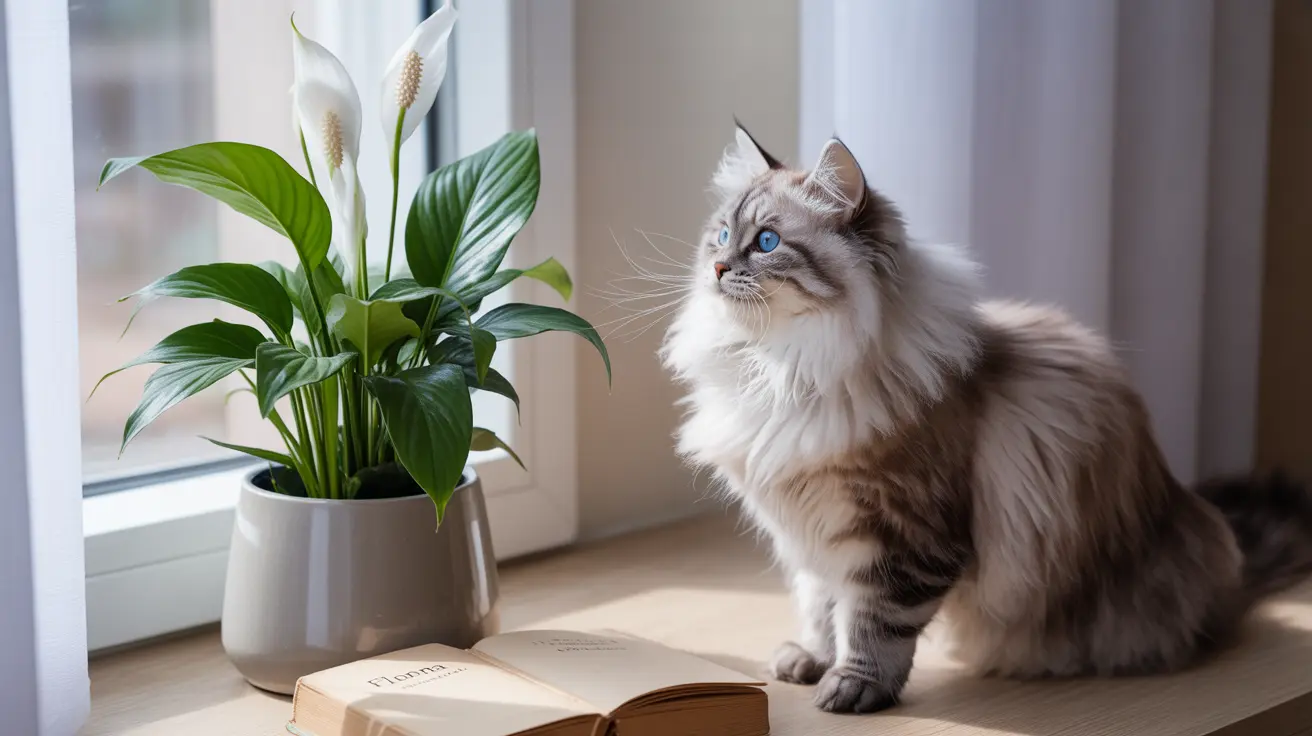If you're a cat owner considering adding peace lilies to your home decor, it's crucial to understand the potential risks these common houseplants pose to your feline companion. While peace lilies can add beauty to your living space, they contain compounds that can be harmful if your cat decides to take a curious nibble.
In this comprehensive guide, we'll explore the specific dangers peace lilies present to cats, what happens if your cat ingests part of the plant, and how to keep your pet safe while maintaining your indoor garden.
Understanding Peace Lily Toxicity in Cats
Peace lilies (Spathiphyllum species) contain insoluble calcium oxalate crystals throughout their structure - from leaves to stems, flowers, and roots. When a cat bites into any part of the plant, these microscopic, needle-like crystals are released, causing immediate irritation to the mouth and digestive tract.
Unlike true lilies (such as Easter lilies or tiger lilies), which can cause fatal kidney failure, peace lilies typically cause less severe reactions. However, the symptoms can still be quite distressing for your cat and warrant immediate attention.
Common Symptoms of Peace Lily Poisoning
When a cat encounters a peace lily, several symptoms typically appear within minutes to hours:
- Intense drooling or foaming at the mouth
- Pawing at the face and mouth
- Difficulty swallowing
- Vomiting
- Loss of appetite
- Oral pain and swelling
- Irritation of the tongue and lips
Immediate Actions if Your Cat Eats Peace Lily
If you suspect your cat has ingested any part of a peace lily, take these steps:
- Remove any remaining plant material from your cat's mouth
- Rinse their mouth with water if possible
- Contact your veterinarian immediately
- Monitor for signs of breathing difficulty
- Keep your cat comfortable and watch for worsening symptoms
Treatment and Recovery
Most cases of peace lily exposure in cats can be managed with supportive care. Your veterinarian may provide treatments such as:
- Pain medication
- Anti-inflammatory drugs
- IV fluids if dehydration occurs
- Medications to control vomiting
- Monitoring for potential complications
Prevention and Safe Alternatives
The best way to protect your cat from peace lily toxicity is through prevention:
- Remove peace lilies from your home or place them in cat-proof areas
- Offer cat-safe plants like cat grass or catnip
- Use deterrent sprays on plants that must remain
- Create elevated plant displays that cats cannot access
- Consider artificial plants as decorative alternatives
Frequently Asked Questions
Are peace lilies toxic to cats, and how dangerous are they compared to true lilies?
Yes, peace lilies are toxic to cats, but they're less dangerous than true lilies. While peace lilies cause oral irritation and gastrointestinal upset, they rarely lead to severe systemic issues. True lilies, on the other hand, can cause fatal kidney failure even with minimal exposure.
What symptoms should I watch for if my cat chews or eats part of a peace lily?
Watch for excessive drooling, pawing at the mouth, vomiting, difficulty swallowing, and decreased appetite. These symptoms typically appear shortly after exposure.
How quickly do peace lily poisoning symptoms appear in cats, and what should I do if my cat shows signs?
Symptoms usually appear within minutes to hours after exposure. If you notice any signs, contact your veterinarian immediately and remove any plant material from your cat's mouth if possible.
Can peace lily ingestion cause serious health problems or death in cats?
While peace lily ingestion rarely causes death in cats, it can lead to significant discomfort and, in severe cases, breathing difficulties due to swelling. Prompt veterinary attention is important to prevent complications.
What are the best ways to protect my cat from peace lily toxicity while keeping the plant in my home?
The safest approach is to remove peace lilies from your home. If you must keep them, place them in rooms your cat cannot access or in hanging baskets well out of reach. Consider using pet deterrent sprays and providing cat-safe alternatives for your pet to chew on.
Conclusion
While peace lilies aren't as lethal as their true lily cousins, they still pose a significant risk to curious cats. The best approach is to err on the side of caution and either remove these plants from your home or ensure they're completely inaccessible to your feline friends. With proper awareness and preventive measures, you can maintain both a beautiful home and a safe environment for your beloved cat.






